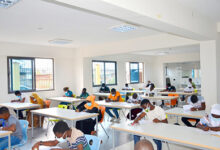
Inadequate number of
schools, furniture and textbooks, teacher absenteeism and stakeholders not
prioritising education of children, have been identified as key factors
contributing to low enrolment of children in basic schools in the Mion
District.
This came to light during a stakeholders’ review
meeting on education held at Sang in the Mion District of the Northern Region
to discuss what to do to support, especially out-of-school children in the
district to access formal education.
The meeting, attended by some teachers,
community members, representatives of the Mion District Directorate of
Education and pupils, was organised by Plan International Ghana, an
international non-governmental organisation (NGO), as part of its Reaching and
Teaching out-of-school Children (REACH) project, which is sponsored by Educate
A Child.
Similar meetings were held earlier this month at
East Mamprusi and Gushegu Municipalities, and Karaga District, whilst
stakeholders in the Nanumba North Municipality, and Nanumba South and Kpandai
Districts would take their turns in the coming days before the end of this
month.
The REACH project is modelled on the country’s
Complementary Basic Education programme (CBE), which affords out-of-school
children, who are beyond school starting age (eight to 16 years), the
opportunity to acquire basic literacy and numeracy skills within a period of
nine months in their mother-tongues to facilitate their enrolment into formal
schools.
Out-of-school children in more than 30 districts
including; Tatale-Sangule, Lawra, Nabdam, Nkwanta South, Ketu North, Kwahu
South and West Gonja in the Northern, Upper West, Upper East, Oti, Volta,
Eastern, and Savannah regions have benefited from the REACH project, which is
in its fifth and final year.
For the first four years, a total of 66,070
children comprising 35,459 boys and 30,611 girls out of a total of 81,000
out-of-school children, who were enrolled onto the CBE programme as part of the
REACH project, transitioned to formal schools.
The stakeholders argued that the inadequate
number of schools, furniture and textbooks, and teacher absenteeism tended to
demotivate pupils from remaining in schools, a situation which continued to
force children to drop-out of schools.
They, therefore, came up with action plans to
provide basic educational needs of children, provide educational infrastructure
in the communities, strengthen supervision of schools and ensure equitable
distribution of teachers to schools to improve the situation to ensure that
children remained in schools.
Mr Nelson Konlan, Mion District Director of
Education, urged community members to play their roles by helping to supervise
schools and report absentee teachers for sanctions and lobby government for
educational infrastructure to ensure that their children accessed formal
education.
Naa Mohammed Bawa, Chief of Tuwua appealed to
teachers to accept to remain in the communities, where their schools were
located to ensure punctuality at schools for improved teaching and learning.
Mr Isaac Gyasi-Ababio, Regional Coordinator,
REACH project at Plan International Ghana, expressed the hope that the
stakeholders would implement their action plans to ensure improved education
delivery for children, especially those who transitioned from the REACH
project, to formal schools.
GNA



